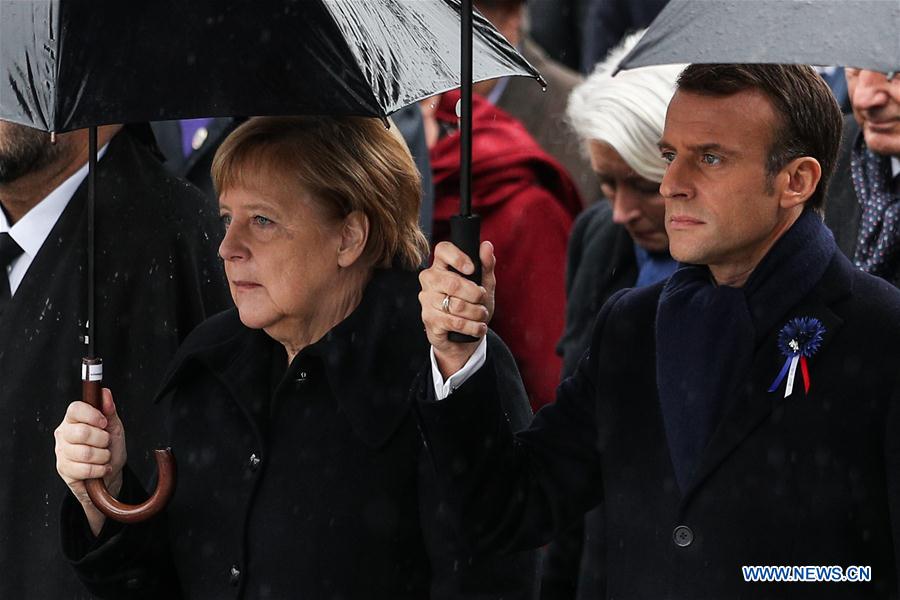Time to remember a war waged to end all wars
- By Sajjad Malik
 0 Comment(s)
0 Comment(s) Print
Print E-mail China.org.cn, November 13, 2018
E-mail China.org.cn, November 13, 2018

It was exactly 100 years on Sunday that the traumatic and devastating World War I officially ended at the 11th hour on the 11th day of the 11th month in 1918 through an armistice signed between the victorious allied powers and vanquished Germany and its allies.
The end of the conflict was commemorated at an Armistice Day ceremony in Paris. Leaders of almost all major participants in the war, including German leader Angela Merkel, attended.
The war was truly, although ironically, "great" due to the sheer magnitude of the death and destruction it unleashed globally. The loss to human life was colossal, with some 9.7 million soldiers and 10 million civilians estimated to have been killed.
The war was given meaning as an effort to eliminate all future wars. However, all those who fought and struggled with the hope they were fighting for world peace were ultimately dishonored as the promised peace was short-lived.
WWI not only brought another global conflict in just over 20 years, but resulted in a series of wars around the world killing many more innocent people and destroying the fabric of society. Some of the conflicts triggered by the great war are still going on – Palestine, for example.
Exactly one hundred years on, the world is once again slowly moving towards a situation that might not be very different from the one preceding the start of the World War I – nationalism, xenophobia, extremism and isolationism are all on the rise.
French President Emmanuel Macron, addressing the Paris ceremony, pointedly talked about some of the issues that world leaders should urgently think about – especially his call to reject the temptations of raw nationalism that is becoming a new monster. Macron termed it a "betrayal of patriotism."
He left no room for ambiguity about whom he was referring – namely U.S. President Donald Trump, condemned for failing to attend the ceremony at the American war cemetery because of "bad weather" – when he declared: "By saying 'our interests first and never mind the others' you stamp out the most precious thing a nation has – its moral values."
Macron and German leader Merkel might be trying – probably in vain – to apply "moral force" to the realm of foreign policy and add morality to the policies to national interests. As Macron called a spade a spade, Merkel at the height of migrant crisis let about a million of them enter her country despite fierce opposition and even at the cost of electoral votes.
The two leaders on Saturday also visited Compiègne, a town to the north of Paris, to sign a book of remembrance in a railway carriage similar to the one used in 1918 to seal the Armistice.
Leaders like Trump are apparently unmoved by such feelings, and are exploiting the deep fissures in the domestic politics on issues of immigration and using nationalistic sentiments to gain an advantage. Hence, the task of leaders who are talking sense becomes ever greater.
The issue of instilling morality in domestic or global politics is one aspect of the problem. The other is that millions of people have been left behind in the struggle for a better life. The post-world war boom since 1945 has benefited only a selective class and the less privileged demand a share.
The rise of new power centers in the 21st century in the shape of new wealthy nations in Asia might have slowed the process of prosperity for some people elsewhere. Instead of fixing the issues of economic downturn, their leaders are using nationalism and religion to keep grip on power.
As the world remembers those who fell in the World War I, the centenary of the Armistice is a time to reject narrow politics of nationalism that were instrumental in unleashing the dogs of war.
Human values, respect for others, a holistic approach to take all people along is the only right path. We should shun the lure of national glory which often turns to be a disaster for others. Let the "others" be part of that glory if it is going to last longer.
The war waged to end all wars proved a mirage. But the leaders should show the wisdom gained over the past 100 years and apply it now to bring peace and prosperity to all.
Sajjad Malik is a columnist with China.org.cn. For more information please visit:
http://www.formacion-profesional-a-distancia.com/opinion/SajjadMalik.htm
Opinion articles reflect the views of their authors, not necessarily those of China.org.cn.





